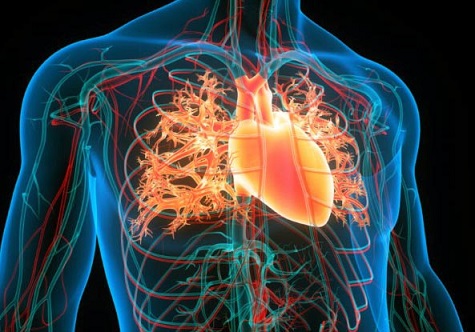COVID-19 induces ferroptosis transcriptomic alterations within the heart, causing cardiac damage
Nikhil Prasad Fact checked by:Thailand Medical News Team Aug 26, 2024 1 year, 4 months, 4 weeks, 5 hours, 52 minutes ago
Medical News: The COVID-19 pandemic, caused by the SARS-CoV-2 virus, has been primarily associated with respiratory symptoms, but its effects extend far beyond the lungs. Recent research has revealed a troubling connection between COVID-19 and heart damage, highlighting a cellular mechanism called ferroptosis as a key player in this process. This
Medical News report delves into how COVID-19 induces ferroptosis-related changes within the heart, exacerbating cardiac damage and potentially leading to severe cardiovascular complications.
 COVID-19 induces ferroptosis transcriptomic alterations within the heart, causing cardiac damage
COVID-19 induces ferroptosis transcriptomic alterations within the heart, causing cardiac damage
Researchers from Shahid Beheshti University conducted an in-depth study to explore the cellular and molecular mechanisms underlying heart damage in COVID-19 patients. Their study focuses on how SARS-CoV-2 triggers ferroptosis within the heart, leading to increased cardiac damage.
Understanding Ferroptosis: A Silent Threat
Ferroptosis is a form of programmed cell death that is distinct from other types of cell death like apoptosis and necrosis. Unlike these, ferroptosis is iron-dependent and is characterized by the accumulation of lipid peroxides, which are toxic compounds that damage cell membranes. This process is particularly harmful to cells with high iron content, such as heart cells, making the heart especially vulnerable during severe viral infections like COVID-19.
The study aimed to unravel the complex interplay between SARS-CoV-2 infection and ferroptosis in the heart. By analyzing RNA sequencing data from the heart tissues of COVID-19 patients, the researchers identified a set of genes related to ferroptosis that were significantly altered in response to the virus. These genes, known as differentially expressed ferroptosis-related genes (DEFRGs), were found to be involved in several critical biological processes, including oxidative stress, amino acid biosynthesis, and lipid metabolism.
Key Findings: How COVID-19 Triggers Ferroptosis in the Heart
The research revealed that the SARS-CoV-2 virus significantly alters the expression of several genes within the heart, promoting ferroptosis and leading to increased cardiac damage. The study identified ten key ferroptosis-related hub genes, including IL6, CDH1, AR, and SIRT3, which play pivotal roles in the process. Among these, IL6, a well-known inflammatory cytokine, emerged as a central player in the ferroptosis pathway, linking inflammation with cell death in the heart.
The researchers also found that these ferroptosis-related genes are involved in critical cellular pathways, such as the citrate cycle and carbon metabolism. These pathways are essential for maintaining the energy balance within cells, and their disruption can lead to severe metabolic stress, further exacerbating heart damage.
One of the significant findings of this study is the identification of miRNAs and transcription factors (TFs) that regulate these ferroptosis-related genes. miRNAs, such as miR-124-3P and miR-26b-5p, were found to interact
with several hub genes, influencing their expression and, consequently, the severity of ferroptosis in the heart. This regulatory network provides a deeper understanding of how SARS-CoV-2 manipulates cellular processes to induce heart damage.
The Broader Implications: COVID-19 and Cardiovascular Diseases
The implications of these findings are far-reaching. The study suggests that the heart is not just a passive victim of COVID-19 but is actively targeted by the virus through the induction of ferroptosis. This discovery sheds light on the underlying mechanisms that make COVID-19 particularly dangerous for individuals with pre-existing cardiovascular conditions.
COVID-19 has been linked to a range of cardiovascular complications, including myocarditis, arrhythmias, and heart failure. The study's findings suggest that ferroptosis could be a common pathway through which these conditions develop, providing a potential target for therapeutic intervention. By inhibiting ferroptosis, it may be possible to mitigate the heart damage caused by COVID-19 and reduce the risk of long-term cardiovascular complications.
Potential Therapeutic Approaches
The identification of ferroptosis as a key mechanism in COVID-19-related heart damage opens up new avenues for treatment. The study highlights several potential drugs that could target the ferroptosis pathway and protect the heart from damage. For instance, pyrvinium, a drug that inhibits the Wnt/β-catenin pathway, was identified as a potential candidate for reducing ferroptosis-induced heart damage. Similarly, other drugs like astemizole and thioridazine, which have known effects on heart tissue, could be repurposed to treat COVID-19 patients with cardiovascular complications.
Moreover, the study also identified key metabolites, such as iron, oxoglutaric acid, and NADPH, that interact with the ferroptosis-related genes. These metabolites could serve as biomarkers for identifying patients at high risk of developing severe heart complications due to COVID-19. Monitoring these biomarkers could help in early diagnosis and timely intervention, potentially saving lives.
Conclusion: A Call for Further Research
The study conducted by researchers at Shahid Beheshti University provides crucial insights into how COVID-19 exacerbates heart damage through the induction of ferroptosis. The identification of key genes, regulatory networks, and potential therapeutic targets opens up new possibilities for treating COVID-19-related heart damage and preventing long-term cardiovascular complications.
However, much remains to be explored. The exact mechanisms by which SARS-CoV-2 triggers ferroptosis in the heart are still not fully understood, and further research is needed to validate these findings in clinical settings. Additionally, the development of ferroptosis inhibitors and their application in COVID-19 treatment represents a promising but uncharted territory that warrants further investigation.
In conclusion, this study highlights the importance of ferroptosis as a critical factor in COVID-19-induced heart damage. As we continue to battle the ongoing pandemic, understanding and targeting ferroptosis could play a pivotal role in reducing the burden of cardiovascular complications associated with COVID-19.
The study findings were published in the peer-reviewed journal: Heliyon.
https://www.sciencedirect.com/science/article/pii/S2405844024125984
For the latest COVID-19 News, keep on logging to Thailand
Medical News.
Read Also:
https://www.thailandmedical.news/news/romanian-study-review-uncovers-how-covid-19-leads-to-arrhythmogenesis
https://www.thailandmedical.news/news/american-study-warns-that-covid-19-is-triggering-the-onset-and-progression-of-atherosclerosis-in-many
